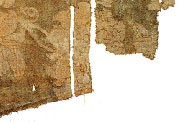 |
 |
|||||||||||||||||||||||||||||||
 |
||||||||||||||||||||||||||||||||
 |
||||||||||||||||||||||||||||||||
| CHAPTER 2 | ||||||||||||||||||||||||||||||||
 |
||||||||||||||||||||||||||||||||
| 02.01 Pendants and birds on cloud background 02.01 (2nd-1st century BC) |
||||||||||||||||||||||||||||||||
| Chain stitch on tabby weave Dimension: warp 154cm; weft 45.5cm Excavated from tomb No.2 at Yinwan Village, Donghai, Jiangsu Lianyungang Museum, Lianyungang |
||||||||||||||||||||||||||||||||
| THE BOOK | ||||||||||||||||||||||||||||||||
| AUTHOR | ||||||||||||||||||||||||||||||||
| CONTENTS | ||||||||||||||||||||||||||||||||
| In 1993, a silk blanket with embroidery was found on the inhabitant of Han dynasty tomb no.2 in Yinwan village, Donghai, Jiangsu. The foundation of the blanket is silk tabby in greenish brown. The embroidery is executed with chain stitch to depict pendants, mythological creatures, winged figures and constellations on a ground of cloud pattern. The cloud pattern on the background is very typical of the Han dynasty. After restoration, they show similarities in form, composition and use of colour to the chang shou (longevity) embroidery found in Mawangdui and in Shenjushan. The principal motif shows three vertical pendants, flanked by winged figures riding phoenix and winged figures with deer. Below the pendants is a scene of ritual for the immortals. This item can be compared to another piece of embroidery found in Noin-ula in Mongolia. Although cut up in several fragments, the Noin-ula piece also shows embroidery of pendants and birds on "longevity" cloud patterns, hence may be used for a similar purpose as this present blanket. Note: Lianyungang 1996, Lubo-Lesnichenko 1995 |
||||||||||||||||||||||||||||||||
| ORDER | ||||||||||||||||||||||||||||||||
| CONTACT | ||||||||||||||||||||||||||||||||
| LINKS | ||||||||||||||||||||||||||||||||
|
||||||||||||||||||||||||||||||||
|
||||||||||||||||||||||||||||||||